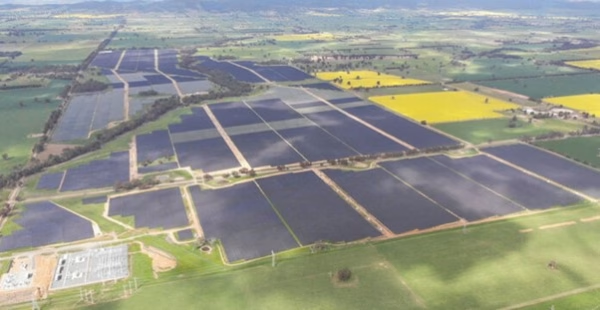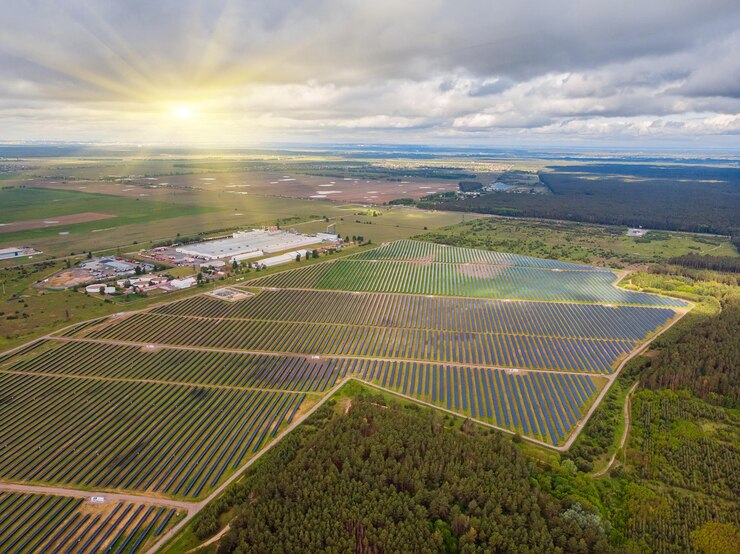The Glenellen Solar Farm, located in the Greater Hume Shire near Jindera and Albury, NSW, is a landmark 260 MWdc / 200 MWac Agri-Solar project covering 263 hectares. Featuring around 380,000 single-axis tracking solar panels and up to 60 power conversion units, the farm will efficiently supply renewable power to the grid. Scheduled for completion in Q4 2025, Glenellen will generate enough electricity to power over 80,000 homes annually. Notably, it will be the first Agri-Solar project for GPG globally, combining clean energy generation with agricultural use to promote sustainable land management and regional development. NSW is seeing more development of solar projects like the recently announced completion of the Walla Walla Solar Farm touted to be Autralia’s largest solar farm at 300MW.
Reported in December 19th 2023 – The Glenellen Solar Farm near Albury is charging ahead after receiving conditional development approval from the New South Wales Independent Planning Commission (IPC) on December 12th, 2023. As a manufacturer aiming to deliver over 6.5 gigawatts of renewable energy projects across Australia, Trina Solar stands to significantly benefit from this positive decision.
For communities in the Riverina region, the Glenellen Solar Farm brings new job opportunities and economic investment to the area. Trina Solar expects to create an estimated 200 construction jobs, along with 10 full-time operational roles once complete. The $250 million solar project will span 300 hectares while minimizing impacts to agricultural capabilities of the land.

Also Read: Woodside Solar Farm Gets Green Light for $300 Million Pilbara Development
Making Headway with the Glenellen Solar Farm Proposal
Initially, the proposal for the Solar Farm encountered concern within the local community. Of the 107 public submissions received, 79 objected to the development near Jindera. Top concerns cited the potential impact to agricultural resources in the area.
After reviewing the project’s merits, however, the IPC concluded that the benefits outweighed the risks. Some factors that contributed to this decision include the site’s proximity to existing infrastructure, solar resources, avoidance of environmental constraints, and continued agricultural uses.
To address issues raised by community members, Trina Solar proactively made several adjustments to the Glenellen Solar Farm’s design. For example, they increased perimeter vegetation screening and reduced the number of solar panels planned. These changes led the IPC to determine that Trina Solar adequately mitigated public concerns.
While utility-scale solar developments often face criticism for taking up productive agricultural land, the Glenellen Solar Farm strives to strike a balance. Trina Solar claims the project will only result in a 25% reduction of sheep carrying capacity for the site.
The majority of land not occupied by solar infrastructure would remain available for sheep grazing and cropping of livestock feed. By using best practices for agrivoltaics, the Glenellen Solar Farm enables dual-use solar and agriculture. This aligns with the IPC’s requirement to maintain agricultural land capabilities as a condition of approval.
What We Can Expect from the Project
Once complete, the Glenellen Solar Farm would generate over 440,000 megawatt-hours of emissions-free electricity per year. That’s enough to power over 80,000 average NSW homes!
The solar farm uses bifacial photovoltaic panels arranged in single-axis tracker systems for optimum productivity. At 200 megawatts, it will connect to the existing 330kV transmission line crossing the property.
The Glenellen Solar Farm approval highlights the considerable renewable energy development opportunities emerging across NSW. Located near the South-West Renewable Energy Zone, the project supports the state’s transition away from coal dependence.
With development consent secured, Trina Solar expects to move forward quickly with construction timelines for the Glenellen Solar Farm. Nearby communities can look forward to more local jobs and clean energy to supply the regional grid in the months ahead. The future is bright for large-scale solar in this area!
Glenellen Solar Farm Factsheet
-
Location: Greater Hume Shire (Glenellen & Jindera), 2 km northeast of Jindera, 16 km north of Albury, NSW
-
Site Area: 398 hectares (263 hectares dedicated to solar)
-
Capacity: 260 MWdc / 200 MWac
-
Technology: ~380,000 single-axis tracking solar panels (up to 5m high)
-
Infrastructure: Up to 60 power conversion units (inverters + transformers)
-
Operational Date: Expected Q4 2025
-
Energy Output: Powers over 80,000 homes annually
-
Developer: Global Power Generation (GPG)
-
Global First: GPG’s first Agri-Solar project worldwide, integrating renewable energy with agricultural use

Leave a Reply